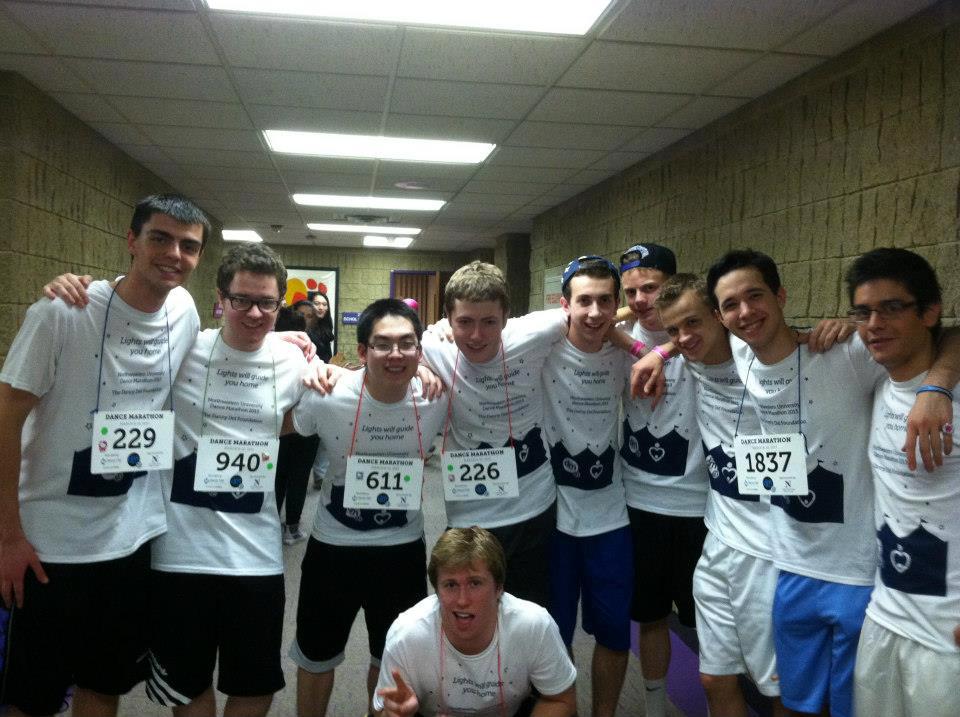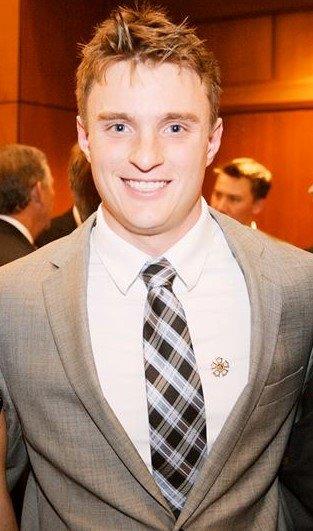Fraternities Build Campus Communities That Wouldn't Exist Otherwise
Conversation

Brothers of Gamma Beta participating in Northwestern’s Dance Marathon in 2013.
By Mark Nelson (Northwestern)
For many undergraduates, my university tends to feel quite lonely. Students are overly competitive, focused on getting the best internship, job, or graduate school acceptance. Throughout the year, one can find numerous students in the library on weekend nights, working through problem sets or preparing for their next interview. We also have what students call the Sheridan Road Effect, where students walk down the main street on campus with their heads down, and if they notice somebody they have met before, they do their best to pretend like they have not seen them. I am not sure exactly what it is but the campus often feels as if it lacks a true sense of community.
I was reminded of this recently when I reached out to professors for letters of recommendation for medical school and received no reply in return.
I then reached out to successful alumni of my fraternity, most of whom did not even attend my school. In contrast, the most popular response I received was, “I’d be honored. When should I get it to you?”
These touching replies further strengthened my belief that my fraternity experience has been the most meaningful part of my college career. Not just for the growth I experienced, but also for the constant support of others.
In middle school I was not the most popular kid by a long shot. It was not that I didn’t have friends at school, I did, but that was the extent of my friendships: School. I would go home every day, do my homework, watch television, go to bed, and repeat. I remember two girls in my class who had parties every Friday night to which most of my friends would be invited. The most painful part was not the Friday afternoon bus rides home listening to everyone talk about the party. That was nothing a pair of headphones couldn’t fix. The most painful part was sitting at home alone on a Friday night. I worked on model airplanes most times, occasionally read a book, and if I was lucky my mom would rent a movie for me. The most eventful nights were when I was the target of prank calls coming from those weekend parties, with the easily identifiable voices of my “school friends” on the line. I didn’t like it, but I learned to not cry about it. I grew comfortable with it
These touching replies further strengthened my belief that my fraternity experience has been the most meaningful part of my college career. Not just for the growth I experienced, but also for the constant support of others.
My life today stands in stark contrast to what it was in middle school, or even high school for that matter, and I owe most of this change to my fraternity. The training and education I received from Sigma Nu staff, alumni, and fellow members, coupled with the endless support of my family back home, has put me in a new and better place. Today, despite the anxiety I came to college with, I sit on important committees with university administrators, have a say in school policy changes, help chapter members through difficult experiences, and speak to other presidents about their leadership and personal values. While the true nerd inside me will always have a passion for academics, this work has truly made my time in college fulfilling.
In addition to personal growth, my fraternity experience has always brought me a sense of comfort. When someone is in a chapter that operates properly they are never alone, regardless of the campus atmosphere. Sure, it is not uncommon for me to take a weekend night to study for the quarter system’s ceaseless barrage of exams, but I can never go one night without at least ten friends asking about going into the city or offering to study for an exam as a group. Both suggestions are always appreciated, especially the test preparation.

Brother Nelson serves as one of the collegiate board members for Sigma Nu Education Foundation’s Board of Directors
Critics of the Greek system point to myriad flaws such as charges of hazing, sexual assault, binge drinking, and drug use. Undeniably, these are serious problems, as they are on NCAA athletic teams, theater groups, club sports, student publication teams, and many, many more places on college campuses. These are issues that need to be addressed and they need to be addressed now. I know this because I hear of occurrences both on my campus and on others. Not only do these problems have no place in Greek organizations but on college campuses in general.
If these issues are to be addressed, it comes down to national organizations holding their chapters to the same standards their founders set years ago, and many organizations do that quite well. However, it is also the responsibility of universities to not only hold Greek organizations to high standards of human decency, but to show consistency by holding other student groups and athletic teams to that same high standard. Currently, the Greek system is in a spotlight in a dark room, but if the problem is ever to be truly fixed, the whole room needs to be lit.
While there are an unfortunate amount of examples of chapters gone wrong, I know that fraternities still have a place on college campuses because I have seen even more examples of fraternity done right. As the president of the Interfraternity Council, I often talk to administrators about the community service and philanthropy that Greek organizations do. I point to members of my chapter working in hospitals and the Chicago Food Depository, or I point to members canning to raise money for ALS research and forming teams for Dance Marathon. I point to these things because they are easy to understand from the outside. What I cannot fully explain is the real world training and education that fraternities provide through genuine national support and heartfelt relationships with alumni and advisors. Nor, in my case, can I fully describe how meaningful it is when alumni and brothers alike go out of their way to help me, whether that is providing letters of recommendation, reviewing my resume, or simply repeating over and over again that I will become that small town doctor I want to be.
When I left for college my freshman year my dad told me that this time was for education, building lifelong friendships, and discovering yourself. That, at its core, is exactly what the fraternity experience is meant to be and what it was for me.
Editor’s Note: We invite brothers of all ages to submit essays about their own Sigma Nu experience. Submissions should be emailed to news@sigmanu.org.